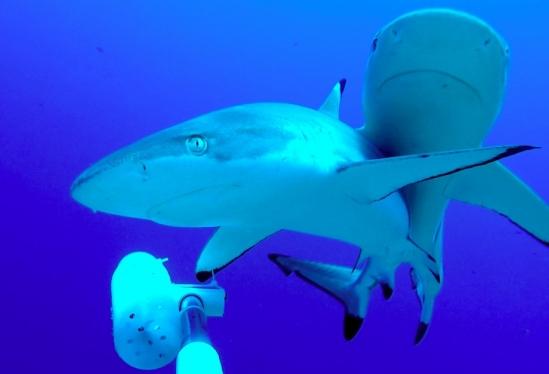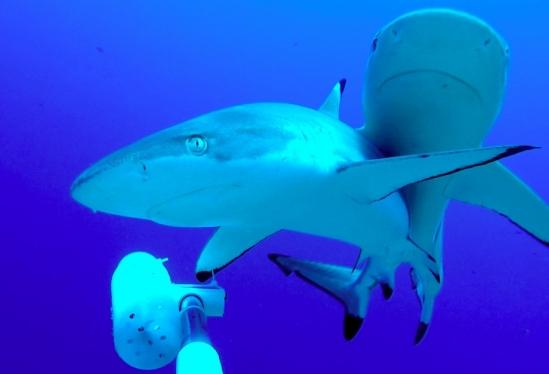
Credit: Darcy Bradley
Swimming with metaphorical sharks is one thing, but actually getting into the water with the razor-toothed ocean predators? Crazy, right? Not according to the masses of shark-obsessed scuba divers who travel great distances — and pay big money — to get face time with the giant fish.
A multimillion-dollar global industry is constructed around the promise of doing just that: cage diving with white sharks in South Africa and Guadeloupe Island; shark feeding in the Bahamas, Mexico or Fiji; diving with huge schools of hammerheads in Cocos Island and Galapagos.
That's great for thrill-seekers, but what about the sharks? As most scuba divers know — and previous studies have shown — sharks more commonly swim away from people than toward them. Does that avoidance behavior persist after the divers leave? Do sharks steer clear of sites that are frequented by divers?
Eager to understand how scuba diving activities over multiyear time scales influence shark behavior, scientists at UC Santa Barbara and Florida International University set out to find answers. They found human-shark interaction can take place without long-term effects on the sharks. Their research appears in the Marine Ecology Progress Series.
"Unfortunately, human impacts on shark populations are ubiquitous on our planet," said lead author Darcy Bradley, a postdoctoral researcher at UCSB's Bren School of Environmental Science & Management. "That makes it difficult to separate shark behavioral changes due to scuba diving from behavioral changes caused by other human activities like fishing."
The researchers went to Palmyra, a remote atoll in the central Pacific Ocean, where shark populations are healthy, fishing is not allowed and the majority of its near pristine underwater world is rarely dived. However, Palmyra is home to a small scientific research station, where researchers dive in a handful of locations. This made the atoll an ideal site for studying whether and how shark abundance and behavior differ between locations where diving is more common and those where it is not.
The team studied whether scuba diving activities have long-term consequences for shark populations. They used baited remote underwater video systems — cameras lowered to the ocean floor with a small amount of bait — to survey sharks and other predators from the surrounding reef.
"After reviewing 80 hours of underwater footage taken from video surveys conducted in 2015 — 14 years after Palmyra was established as a wildlife refuge and scientific diving activities began — we found that shark abundance and shark behavior were the same at sites with and without a long history of scuba diving," said co-author Jennifer Caselle, a research biologist at UCSB's Marine Science Institute.
"Our results suggest that humans can interact with reef sharks without long-term behavioral impacts," Bradley said. "That's good news. It means that well-regulated shark diving tourism doesn't necessarily undermine shark conservation goals."
###
Media Contact
Julie Cohen
[email protected]
805-893-7220
@ucsantabarbara
http://www.ucsb.edu
############
Story Source: Materials provided by Scienmag





